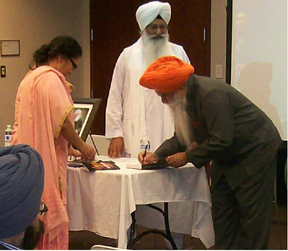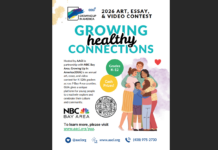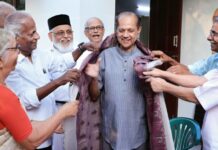
CHICAGO: American Sikh Community of Chicago, USA hosted a seminar on Bhai Kahan Singh Nabha at Palatine Public Library on Sunday May 31. Thakar S Basati was one of the organizers and host for the seminar.
Bhai Sahib is known the world over for his compilation of Sikh Encyclopedia Mahan Kosh in Punjabi language with over 64,000 words in it. He took about 14 years to compile it and 2.5 years to publish it. It has been translated into other languages now.
Bhai Sahib wrote over 25 books and also his travelogue that was published by his grand daughter-in-law Dr Rachhpal Kaur Singh. Although Bhai Sahib himself had no formal school education, yet people did Doctorate of Literature (D.Lit.) on his writings.
Dr Hal Snyder, newly elected Palatine Library board member also showed up and welcomed the audience to Palatine Library. He offered his services to the Sikh community if ever there is an issue regarding library and people wanted to discuss.
Bhai Mohinder Singh Chicago as the first speaker observed that Bhai Sahib was truly a scholar and scholars have no enemies. His book that Sikhs and Hindus are not one was devoid of any negative representation of Hindu religion. It was just to clarify that Baba Nanak’s philosophy is different from Hindu philosophy.
Bhai Surjit Singh Zakhmi said Bhai Sahib worked for 18 days on defining Ek Onkar only, that starts with word Ik (One) and Onkar denoted by first letter Oorha of Punjabi alphabet. There are about 1367 words associated with Oorha alone. There are about 64263 words in it. Bhai Surjit Singh is a known authority as Sikh Katha Wachak (explaining) and he attributes his success to Mahan Kosh.
One significant aspect of Sikh Holy Book Shri Guru Granth Sahib is that Gurus kept the main words in their original tongue they were written, specially the Shabads (hymns) of saints of different religions and Bhai Nabha went to those places to understand those words properly. At the behest of King of Nabha State, he went to England on ship to help McAuliffe learn Punjabi and correct any mistakes he may have made in the book.
Dr Gurbachan Singh was the Keynote speaker. In his address, he mentioned that Bhai Nabha was well versed in many languages. He learned Persian from a Moulvi (Muslim teacher) which caused some uproar in Sikh community. He had a son Bhagwant Singh who was also well versed in Gurbani.
With his participation, idols which Hindus had placed in and around Harimandir Sahib (also known as Golden Temple) were removed. He not only wrote about Sikhi but also helped correct some Hindu books.
He was also instrumental in the passage of Sikh Marriage Act. Bhai Sahib got his widow niece remarried. King Nadir Shah presented him with, “Sword of Honor” for his knowledge. He had immense knowledge of music and poetry. He wrote so much for the betterment of others, we only wish people would read him
Dr Gurbachan Singh also talked about travels of Baba Nanak and his philosophy about creation, his love of Nature, his thoughts on ecology which he touched in a very scientific way. Dr Sahib also showed slides about what Gurbani means by Aad Sach, Jugaad Sach and Urbad Narbad. He has compiled data that explained Sikhs’ belief in Nature. He explained the conditions of pre-universe phase to today’s life.
Dr. Sahib is staying with Prof. Hundal Sahib and can be reached at 630-995-0670.
Professor (Retd) Kulwant Singh Hundal talked about the importance of understanding Naam (recitation) and meaning of Shabad (hymn). He said many Sikh preachers do not know the true meaning of Naam and Shabad. He conversed with some of them. When he got no satisfactory answer, he had to read some Hindu Vedic books on meditation and then got help from Mahan Kosh to fully understand how one can reach God by reciting his name and be at peace from within.
Dr Jagjit Singh Teji shared that he couldn’t read Punjabi in his primary school but always wanted to understand true meaning of words used in Gurbani. It was Mahan Kosh that helped him understand them. Then he also read Bhai Sahib’s Gurbani Martand in 2 volumes that helped him find his true identity as a Sikh. He also regretted that many Sikh young children are moving away from Sikhi because “we are unable to connect them with their glorious past.”
Light snacks were provided. In the end, Thakar S Basati thanked the audience and speakers for their valuable time.
Surendra Ullal






